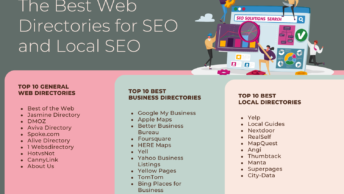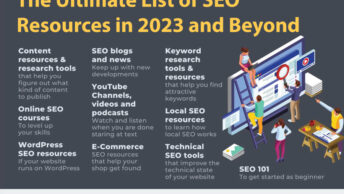There is no question that the nature of the Information Age has changed the face of marketing forever. Businesses big and small finally understand that having a website isn’t an option – it is necessity. There isn’t a potentially successful business plan created today that doesn’t include a budget for building a website. The vast majority of business owners have also begun to understand that simply having a website isn’t enough and that a sound Internet marketing plan is just as important as the existence of the website itself.
The landscape of Internet marketing, and search marketing in particular, is changing. These days just optimizing your company’s website to perform well in search results isn’t sufficient. Repetition is the key to success in the search results these days in much the say way it is in traditional marketing. With respect to the search results, that means having multiple results on the page that correlate to your brand. For instance, a search result for “athletic shoes” that includes multiple references to Nike is a search marketing success.
The way to accomplish that is by publishing content that references your brand or what you offer (i.e. the keywords used to find your products and/or services) on multiple sources, rather than relying solely on creating content for your website alone. The fact is that the more sources upon which you create and publish unique content, the greater chance you have of monopolizing multiple results in the SERPs for your target keywords and successfully building your brand online.
Squidoo – Search Engine Friendly Content & 400,000+ Visitors Per Day
Perhaps one of the most well-known user-generated content sites is Squidoo. Founded in 2005 by Seth Godin, best selling author and blogger, Squidoo boasts nearly 1 million user-generated “lenses” – the term Squidoo uses to reference to its user’s pages – and is among the 300 most popular sites in the United States.
With that popularity comes an enormous opportunity to connect with Squidoo users via your own personal lenses. Not only that, Squidoo touts a search engine friendly format that increases the chances that someone doing a keyword search in search engines like Google and Yahoo! will find your lens in their search results.
Unlike many user-generated content and Social Media sites that use “NOFOLLOW” links, the links within your Squidoo lenses are “FOLLOW” links. That means linking to pages of your website in a Squidoo lens will help to build link popularity. If you’re going to create content for a user-generated site, getting the bonus of some added link popularity for your own site certainly helps to kill two birds with one stone.
eHow – 2 Million Pages & 16 Million Unique Visitors Monthly
The nature of eHow is a bit different than Squidoo, in that the entire site is essentially dedicated to “how-to” and tutorial type content. That said, eHow is the most highly trafficked user-generated content site we will mention here. In order to appeal to the eHow audience, it is important that your content follow a “how-to” approach.
For instance, if you sell headphones, creating an article for eHow entitled “Choosing The Best Headphones”. If you sell cars, writing an article entitled “How To Improve Your Gas Mileage” would be applicable both to your industry and the format of eHow. Unlike Squidoo, eHow does not provide users with the added bonus of “FOLLOW” links. Any links you include within your articles will provide an avenue for users to find your website more easily, but it will not have a positive impact on your link building efforts.
HubPages – Search Friendly Infrastructure & Revenue Generation For Contributors
It’s important to note that the vast majority of user-generated content sites, including Squidoo and eHow, provide revenue generation opportunities for their contributors, but HubPages was the first to begin paying its contributors up front for articles they believed to be of particularly high quality – rather than paying them based on ads clicked by visitors to the articles alone. They elected to do so in part because of the increase in exposure such well-crafted articles would bring to HubPages in the search results.
Why is HubPages so focused on quality articles? It turns out that quality vs. quantity is the very motto of HubPages. HubPages set out to overtake their closest competitor, Squidoo, in what – at the time – was considered someone radical and unconventional. First, they removed all adult content from the site. They also decided to force publishers who were using HubPages primarily to promote individual products and service to revise the articles to be more information in nature and reduce the excessive linking that had previously occurred. Personal HubPages, duplicate content copied from other sources and pages that linked out to questionable sites (like known phishing sites, excessive pop-up ad sites and URLs that redirect were unpublished.
In the short term this reduced the overall traffic to HubPages enormously. In the long run, though, the increase in the quality of the site content won out. HubPages is now comparable, if not equal, to Squidoo in terms of traffic – despite the fact that HubPages continues to focus on quality information that does not include adult or promotional/marketing content that typically generates a lot of traffic.
Other User-Generated Content Sources
Squidoo, eHow and HubPages may be among the most popular user-generated content sites today, but they’re not the only games in town. Other user-generated content sources to check out include:
Associated Content
Suite101.com
Bukisa
Today.com
Xomba
These user-generated content sites are among the most underutilized mediums for online reputation management and branding. Sites like eHow, HubPages and Squidoo provide site owners with a unique opportunity to create content and publish it using their search engine friendly platforms. Doing so not only gives you another information source that may be found in the search engines, but user-generated content sites also have an audience of millions of visitors on a monthly basis.
Remember – if you’re working to build a brand or maintain a company’s online reputation, the more sources you use to publish and promote content, the better.







[…] more from the original source:? Taking Advantage of User-Generated Content Sites Tags: branding, design, hubpages, internet-marketing, journal, press-releases, search, […]
[…] this story since UGC sites can also serve as great sources for quality links. Alysson Fergison has a nice list of the most popular UGC sites with some explanation why each one is […]
[…] this story since UGC sites can also serve as great sources for quality links. Alysson Fergison has a nice list of the most popular UGC sites with some explanation why each one is […]
I use Squidoo all the time. Its one of my favorite to publish my contents.
Certainly these sites are very important and useful from an online marketing perspective. These websites are always a part of any online marketing campaign…